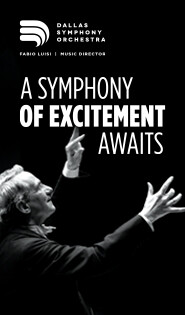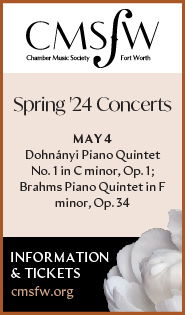Cliburn semifinal: Round 5

Kenneth Broberg performed Mozart’s Piano Concerto No. 25 with Nicholas McGegan and the Fort Worth Symphony Saturday night. Photo Ralph Lauer
The Fort Worth Symphony and conductor Nicholas McGegan began their role in the 2017 Cliburn Competition Saturday evening with four of a total of twelve semifinal round Mozart concerto performances scheduled through Monday night. Throughout the evening, McGegen and the orchestra provided a sturdy foundation, with a wide dynamic range, assertive phrasing, and a broad range of colors appropriate to this music.
First up, performing the Concerto No. 20 in D minor, Italian Leonardo Pierdomenico presented a competent reading, offering the clean passagework and calmly classicist sort of performance one would expect at the very least from a semifinalist at a major piano competition. He showed little else to set him apart from the bevy of twelve semifinalists, however.
But American Kenneth Broberg, performing the Concerto No. 25 in C, and making his first appearance in the semifinal round, gave plenty of cause to perk up tired ears on the third day of semifinal performances. Picking up on McGegan’s carefully shaped and eventful presentation of the orchestral introduction, he responded with an imaginative shaping of themes, revelation of inner voices, and an unfailing sense of momentum in each movement. His solo entry in the slow movement encapsulated his performance: the simple three-note descending broken chord absolutely drew the audience in. (In an amusing improvisational touch in the first movement, he added a bit of La Marseillaise, mimicking a rising motif from the movement, into the cadenza.) This is the sort of performance one would long to hear more often on those occasions when symphony orchestras program Mozart concertos.
American Daniel Hsu, who had presented his semifinal round solo performance Thursday evening, completed his bid for a slot in the finals with the Concerto No. 21 in C, exploiting the work largely as a showcase for brilliant passagework, but with little convincing emotional content. He utilized cadenzas by his brother, pianist-composer Andrew Hsu, which played up to his strengths for glittering scales; his finest moment came in a sweetly lyrical reading of the central Andante.
The evening’s second performance of the Concerto No. 20 in D minor featured South Korean pianist Dasol Kim, who had made one of the strongest recital performances of the semifinal round with a program of Mendelssohn, Kapustin, and Schubert on Thursday evening. Kim found plenty of drama in the outer movements, and wisely played the cadenzas supplied by Beethoven. His weakest moment was in a dull, largely colorless reading of the central Romanze.


